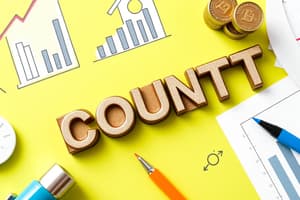Podcast
Questions and Answers
What best defines assets in a financial context?
What best defines assets in a financial context?
- Income generated from investments
- Resources that can be used for liability management
- Property, stocks, and other resources owned (correct)
- Financial obligations of a person or company
Which of the following is NOT considered an asset?
Which of the following is NOT considered an asset?
- Cash in hand
- Outstanding loans to be paid (correct)
- Stocks in a company
- Real estate property
Which of these options includes examples of financial assets?
Which of these options includes examples of financial assets?
- Utilities and expenses
- Bank deposits and bonds (correct)
- Interest payments and dividends
- Rent payments and salaries
Why are assets important for a business?
Why are assets important for a business?
Which of the following would NOT typically be classified as an asset?
Which of the following would NOT typically be classified as an asset?
Which statement accurately describes GDP?
Which statement accurately describes GDP?
Which of the following best describes the term 'assets'?
Which of the following best describes the term 'assets'?
Why is GDP an important measure for a country?
Why is GDP an important measure for a country?
What type of resources can be classified as assets?
What type of resources can be classified as assets?
Which of the following would likely not impact a country's GDP positively?
Which of the following would likely not impact a country's GDP positively?
Flashcards are hidden until you start studying
Study Notes
Assets Defined
- In a financial context, assets represent anything owned with a value that can be converted into cash. Simply put, assets are resources a company controls.
- Assets are the tangible and intangible things that the business owns.
Asset Characteristics
- Tangible assets: These include physical items like land, buildings, and equipment.
- Intangible assets: These are non-physical resources like patents, trademarks, and goodwill.
- Financial assets: These include investments, accounts receivable, and cash.
What's Not an Asset?
- Liabilities, representing obligations owed by a business.
Asset Significance
- Business success: Assets are crucial for a company's financial well-being and ability to generate revenue.
- Funding: Assets can be used as security for loans, providing necessary funding for operations.
- Valuation: The total value of assets can be used to determine the worth of a business.
Examples of Financial Assets
- Cash and cash equivalents: readily convertible into cash.
- Investments: securities like stocks and bonds.
- Accounts receivable: money owed by customers.
- Inventory: goods held by a business for sale.
Examples of Non-Assets
- Expenses: costs incurred in running a business, like salaries and rent.
- Liabilities: things the business owes to others, such as loans and accounts payable.
Defining Assets
- Assets are resources controlled by an entity as a result of past events, and from which future economic benefits are expected to flow to the entity
- Assets are things of value that are owned by an individual or a company.
- Assets are resources that are expected to provide future economic benefits.
- Assets can be tangible (physical) or intangible (non-physical)
Assets Examples
- Financial assets: Stocks, bonds, cash, and bank deposits
- Non-Financial assets: Buildings, equipment, land, vehicles, and intellectual property
- Tangible assets: Physical assets such as land, buildings, and machinery.
- Intangible assets: Non-physical assets such as patents, trademarks, and goodwill.
What is NOT an Asset
- Liabilities are not assets; they represent obligations to pay others.
- Expenses are not assets; they represent the costs of operations.
- Losses are not assets; they represent reductions in value.
Asset Importance
- Assets are important for businesses because they provide them with the resources they need to operate and generate revenue.
- Assets are a key factor in a business's profitability and financial well-being.
- Assets are used to produce products and services, generate revenue, and create value for the business.
GDP
- Gross Domestic Product (GDP) is the total value of all goods and services produced in a country in a given time period.
- GDP is a measure of economic activity and is used to track a country's economic growth.
- GDP is important for analyzing a country's economic health and making informed economic decisions.
- Changes in GDP can impact interest rates, inflation, and employment.
- Increased productivity typically leads to higher GDP.
What Impacts GDP
- Factors that can negatively impact GDP:
- High unemployment
- Increases in inflation
- Political instability
- Natural disasters
- Declines in consumer spending
- Trade wars or global recessions
Studying That Suits You
Use AI to generate personalized quizzes and flashcards to suit your learning preferences.




